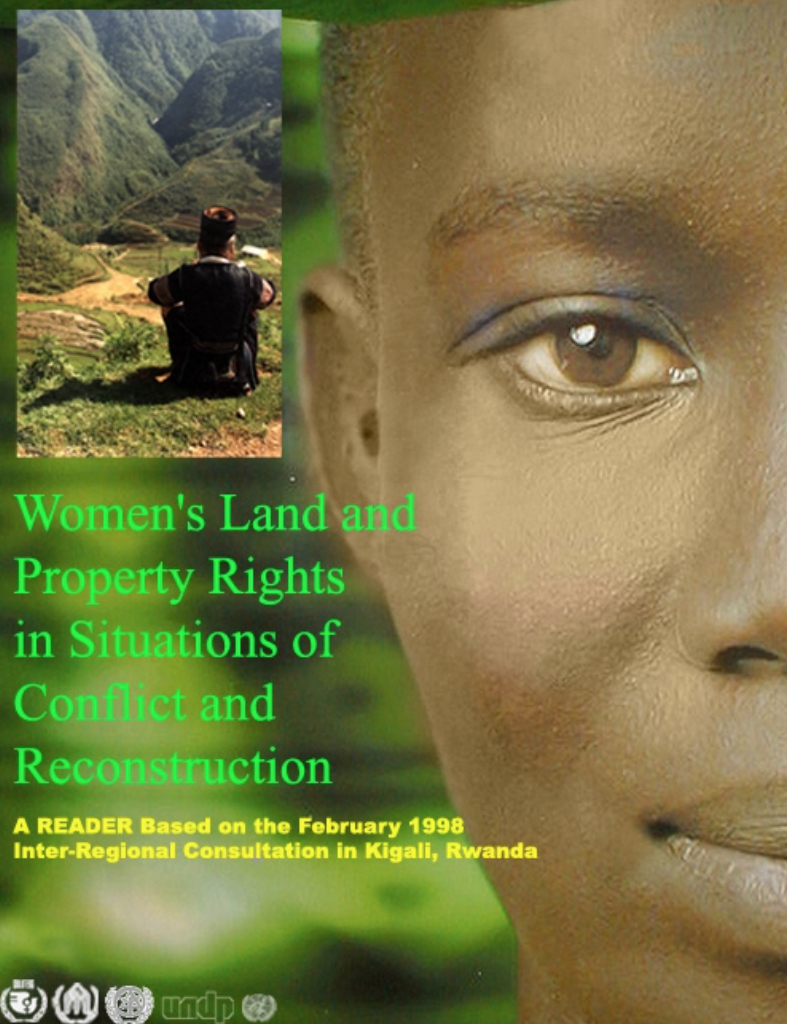Women constitute the majority of small farmers, particularly in sub-Saharan Africa. Yet, in countries around the world, they continue to be denied the right to own the ground that they cultivate and on which they raise their families. This publication, “Women’s Land and Property Rights in Situations of Conflict and Reconstruction,” presents a diversity of views and experiences that describe the multiple strategies being used in countries worldwide to secure women's rights to land and property. Nowhere is the impact of unequal land rights more acutely felt than when women find themselves obliged to fend for themselves and their families as a result of conflicts which have cost them the husbands, brothers or fathers in whose name land and property was traditionally held and passed on. On returning home to the fields they used to work and the house they used to keep, women in many countries find themselves denied access, often by their former in-laws or neighbours. Without the security of a family home or the income and produce of their fields, women and their dependants may be pushed to the margins of society, further exacerbating their struggle to achieve health and well-being for their families and themselves. Against this sombre background, the unstinting efforts of women at all levels to keep families functioning in adversity, maintain community dialogue and sustain the fabric of social development, go largely unsung. Against all the odds, women continue to organise to address their livelihood and empowerment needs, and increasingly to champion their rights. They want a place at the peace table. And they are lobbying for new legislation that can enable them to acquire land, property and credit facilities with which to restart their lives. Above all, they recognise that conflict, with its attendant trauma and displacement, has also honed their existing skills and taught them new ones. As returnees from refugee situations - or something like that, they are not prepared to revert to the status quo ante but wish to capitalise on the changes brought about in adversity. In recognition of women's determination to secure these new opportunities, UNIFEM, together with the United Nations Centre for Human Settlement (Habitat), the United Nations High Commission for Refugees (UNHCR) and the United Nations Development Programme (UNDP), convened the first 6 Women’s Land and Property Rights in Situations of Conflict and Reconstruction Inter-Regional Consultation on Women's Land and Property Rights in Situations of Conflict and Reconstruction. This took place under the aegis of the Government of Rwanda in Kigali, in 1998, barely four years after the genocide which tore an already divided society and its component communities apart. This ground-breaking Conference brought women from across Africa, South and Central America, the Balkans, the Middle East and the Asia-Pacific region to compare notes and exchange experiences. Striking similarities became apparent, despite the wide variety of contexts from which the case-studies were drawn. Despite advances in the international rights regime, persistent discrimination evident in the customary laws which regulate women's status in most traditional societies was a constant factor across cultural, social and political divides. The case-histories and testimonies recorded by the Kigali Consultation provide an insight into changes in land and inheritance rights brought about by conflict and its attendant social disruptions. Out of the acute distress experienced by women caught up in such circumstances, has grown a new realisation by the women themselves of their resilience and strength in adversity. Their stories testify to a new determination to assert women's rights in their productive, reproductive and ownership roles, all three representing long- term investments in their future communities and societies. The Kigali papers which follow represent only a snapshot of what has been taking place around the world, for the process is ongoing. Whether society will recognise these gains, secure them through new legislation -- as has since happened in Rwanda itself, -- capitalise on women's capacities, and allow them their rightful place at the peace table and in decision-making at all levels, is the subject for new chapters which are still being written. It is UNIFEM's role to assist in this process. I feel privileged, as one of many contributing to this work, to be able to salute the efforts of such women around the world working tirelessly and often invisibly to make these changes a reality.


